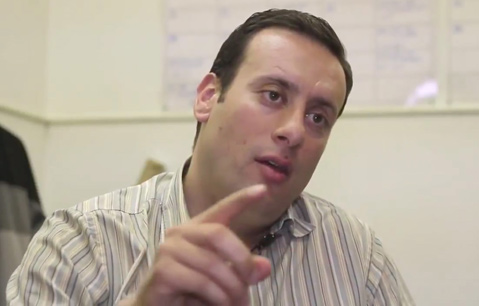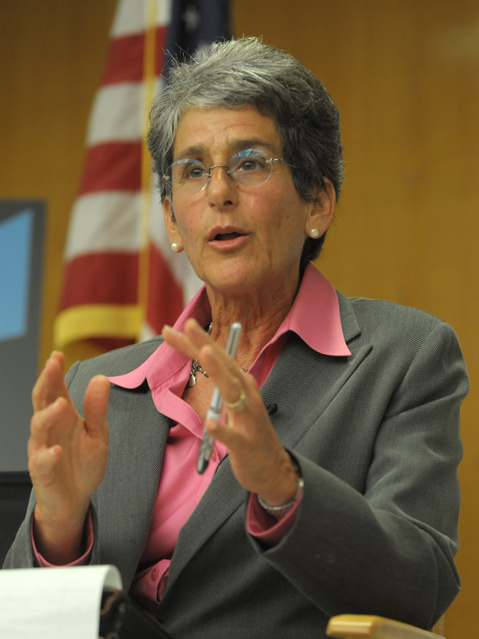Parental Leave Back from the Dead?
Jackson Hints at Retaliation by Wife-Beating Committee Chair

State Senator Hannah-Beth Jackson announced she plans in the final month of this year’s legislative session to bring back a bill that would extend job protection for workers on parental leave.
On June 22, Jackson’s bill — SB 1166 — died in the Assembly Labor and Employment Committee, which at the time was chaired by West Covina Democrat Roger Hernández. Two months prior, Jackson had issued a public letter demanding that Hernández take a leave of absence from the Legislature pending resolution of spousal-abuse charges filed in April by his now ex-wife, Baldwin Park City Councilmember Susan Rubio.
Hernández denied ever striking Rubio, but on July 30, a Los Angeles judge granted Rubio’s request for a three-year restraining order, finding Rubio’s testimony to be credible and Hernández’s not. Shortly thereafter, he was stripped of his chairmanship. Earlier this month, Hernández was conspicuously absent from office, having submitted a doctor’s note stating he’d be out for a week and a half. In that time, he will continue to receive a daily stipend of $176 to cover incidental expenses associated with performing his legislative duties. That is in addition to his salary of $101,000 a year.

In the June 22 hearing, Jackson said Hernández did not speak before casting a vote to abstain on her bill, which would extend parental-leave job protection to include smaller companies — those with 10-50 employees. Current law already offers such protections to businesses with 50 employees or more. Three other committee members also opted to abstain from Jackson’s bill, effectively killing it. Only two members of the committee voted for it. One — Democrat Tony Thurmond — has since been appointed to replace Hernández as chair. A Sacramento insider suggested that if the vote occurred today, the outcome would have been very different. While Jackson shied away from outright accusing Hernández of retaliation, she also stated, “You can’t pretend there isn’t a possibility of retribution here.” Phone calls and emails to Hernández’s office have not been returned.
Jackson said she met with Hernández after calling on him to step down and before the committee hearing to explain the particulars of her legislation. “I wanted to make sure he understood what was in it and that he could look beyond our past issues,” she said. “I got no response. Nothing.”
Committee member Kansen Chu, a Democrat from San Jose, also voted to abstain, but said he was concerned the bill could hurt small businesses. He denied he was part of any effort to punish Jackson for speaking out against Hernández. “I didn’t even know about it,” he said. “I don’t pay much attention over here to those problems. I’m just a public servant. I’m not a politician.” Chu said he plans to meet with Jackson in hopes of getting her to amend the bill. He said he’d support a bill that exempted companies with 10 full-time workers per shift rather than 10 full-time workers overall. Those smaller companies can’t afford the cost of hiring a “floater,” he said.
Although the California Chamber of Commerce has attacked SB 1166 as a “job killer,” Jackson argued that companies who provide paternal-leave protections engender far greater employee loyalty and enjoy improved morale. “It’s actually good for businesses,” she argued. Jackson said about one-third of employees who are eligible for paternal leave — six weeks paid and six weeks unpaid — do not avail themselves of it. Many, she said, worry that their jobs will be taken before they return. Jackson noted that all employees pay into the family leave account via paycheck deductions.
She argued not only that family leave improves bonding between parents and children at a crucial time in childhood development but that such bonding also reduces the prevalence of postpartum depression among mothers. Six months of parental leave, she added, is common in Scandinavian countries, the United Kingdom, and Australia.
Last year, Jackson introduced a far more sweeping family-leave bill, and that sailed through the Labor and Employment Committee with the backing of both Hernández and Chu. That bill would have guaranteed job protection for employees taking family-leave time, not just for newborn children but also to tend to ailing relatives. That bill was vetoed, however, by Governor Jerry Brown.
Some Sacramento insiders have questioned why Hernández and Chu could have supported last year’s more onerous bill while opposing this year’s less expansive measure. This apparent discrepancy, they’ve suggested, indicates political retaliation. Chu pointed out that last year’s bill limited such protections to companies with 50 or more employees, not the smaller companies that Jackson is hoping to cover with SB 1166. Others noted that Hernández has been so unpredictable over the years that it’s hard to attribute motivation to his actions with any precision.
The Hernández domestic saga has been a slow-motion train wreck that seems to only get worse with the passage of time. And it was plenty bad to start with; in her filing for a restraining order, Rubio alleged Hernández assaulted her 20 times over the last three years; they’d been married the last 18 months. On one occasion, she charged, he’d choked her with a belt; in another he’d beat her with a broom; once he threatened her with a knife. Sometimes, she said, these assaults were accompanied by accusations of infidelity; in others, that she hadn’t been attentive enough.
In court, Hernández accused Rubio of fabricating these allegations, stating in documents, “I would never engage in the type of conduct the respondent has accused me of committing,” adding that he found domestic abuse to be “deplorable.” Rubio insisted the violence was sufficient to induce flashbacks. She said he did not take legal action before for fear of hurting the couple’s political future. No criminal charges have been filed.
In 2012, a previous girlfriend of Hernández’s filed similar claims against him, alleging he whipped her with a belt, assaulting her twice. According to other media reports, prosecutors declined to pursue the case because there were no independent witnesses to corroborate the accusations. Although the girlfriend withdrew her civil complaint, a restraining order was issued against Hernández.
In the July 30 ruling, the judge’s three-year restraining order requires Hernández to stay at least 100 feet away from Rubio. Immediately afterward, Hernández was stripped of his chairmanship and any leadership assignments by Assemblyleader Anthony Rendon.
For the Legislature, Hernández’s conduct raises seriously thorny issues. In June, voters approved a statewide ballot initiative empowering the government to suspend the pay of legislators who engage in misconduct. Nothing in the initiative, however, defined the level of misconduct required to trigger this level of financial rebuke.
Even Jackson is of multiple minds what the Legislature should do. “We should be above reproach,” she said. “We are already looked upon with a jaundiced eye.” Jackson acknowledged Hernández had not been charged with a crime, but she expressed belief in the allegations against him. “He had a full trial on the issues, and the judge did not believe him,” she said. “And for the most part, women have a very hard time coming forward when they are abused, so the idea she’s making this up doesn’t really wash.”
State Senator Jackson said it should be up to the Assembly leadership to decide whether Hernández’s pay should be suspended, not members of the Senate. That being said, she added, “If the Assembly leadership were to take that step, I would not be disappointed.”
Assemblyleader Rendon has publically urged Hernández to resign. But privately, some statehouse insiders have noted that Hernández’s vote could make the difference between success and failure on many bills between now and the legislative term’s expiration on September 1. As a practical matter, there will be little rush to impose financial sanctions. And given the perception that Hernández can be thin-skinned and vindictive, his fellow Democrats will be reluctant to even criticize him for fear of jeopardizing their own bills. Because he is about to be termed out of office in Sacramento, many feel little urgency to act. Not surprisingly, Republicans have been the most vocal in demanding Hernández’s pay be cut, though it’s unclear how hard they’re inclined to push the issue.
In the meantime, Jackson remains certain she will reintroduce SB 1166 in some fashion, claiming strong support from labor groups and women’s organizations. What form that will take, however, remains to be seen.
This November, Hernández is running for Congress against incumbent Democrat Grace Napolitano, having come in second in a three-way primary this June. His spousal-abuse issues will feature prominently in Napolitano’s campaign, as it did in the primary. Running to fill Hernández’s seat in the Assembly is Blanca Rubio, sister of Susan Rubio.



